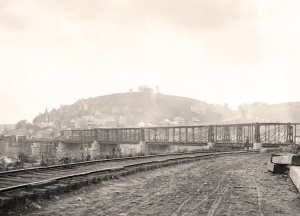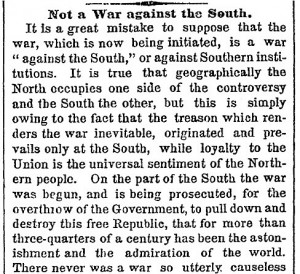It was bound to happen sooner or later. Last week, sadly, we discovered that there was a forged document in the House Divided research engine. David Gerleman from the Papers of Abraham Lincoln contacted us to point out that a letter supposedly written by Abraham Lincoln to Georgia politician (and future Confederate Vice President) Alexander Stephens, dated January 19, 1860, was a known Lincoln forgery. The letter (since removed) was full of memorable and sometimes unLincolnian statements about the sectional crisis and ended with the line: “This is the longest letter I ever dictated or wrote.” Since Lincoln was not in the habit of dictating anything at all (especially in those pre-presidential days), this was a document that should have set off warning bells. But it was published as part of a pamphlet that had been produced during the centennial of Lincoln’s birth in 1909 and even now remains in wide circulation on the Internet and elsewhere. A recent scholarly article in the Tulane Law Review by John Inazu (“The Forgotten Freedom of Assembly” 2010) even began by quoting from it. Yet there was no such exchange with Stephens. For a full discussion of the problems with the alleged January 19, 1860 document, see the article, “Four Spurious Lincoln Letters” in the Bulletin of the Abraham Lincoln Association 21 (Dec. 1930): 5-9, available online here). You can view the text of the forged document at the Internet Archive (where we apparently found it) inside a pamphlet edited by noted Lincoln collector Judd Stewart and entitled, Some Lincoln Correspondence with Southern Leaders Before the Outbreak of the Civil War (1909). Stewart was one of the so-called “Big Five” of early Lincoln collectors and was careless enough to fall victim to these types of scams (his collection, stripped of several other faked items, is now housed at the Huntington Library in California). During the decades after Lincoln’s assassination, there was practically a land office business in Lincoln forgeries, and their ripple effects are still being felt today. I exposed one of these problems in 1999 when actor Warren Beatty and journalist Jonathan Alter used a phony Lincoln quotation about the evils of big corporations that had originally been ginned up during the Populist era and continues to be quoted and re-quoted today despite numerous debunkings. History News Network reprinted the piece in 2005 when author Kevin Phillips and historian Paul Kennedy both made the same mistake of admiring a Lincoln who sounded suspiciously like William Jennings Bryan. What’s the lesson in all this for teachers and students? Check your sources. We never should have used a 1909 pamphlet for a Lincoln document when the Collected Works of Abraham Lincoln (8 vols., 1953; 1974, 1990) is the current gold standard in Lincoln’s writings (though the online Papers of Abraham Lincoln, where Gerleman works, will soon become the new AAA-rated repository for all things Lincolniana). And always remember, when a story or document seems too “good” to be true … it just very well might be.
30
Jan
12
We Got Punked, Lincoln Forgery-Style
Posted by Matthew Pinsker Published in Antebellum (1840-1861), Letters & Diaries, Recent News20
Jun
11
“Fugitives from Oppression”
Posted by sailerd Published in Civil War (1861-1865), Historic Periodicals One hundred fifty years ago today the Ripley (OH) Bee reported that three families from central North Carolina had recently passed through Ripley, Ohio on their way to Indiana. These families, as the Bee explained, “were escaping from the reign of terror” that existed in the South. The families’ “joy over their deliverance from the thralldom and terrorism of secession was openly expressed.” As the Bee explained, they had been forced to leave in North Carolina “their farms stock and other property, which they could not bring in their wagon.” As they traveled north, the Bee described how “they had as little communication, as possible, with the people on the road and when asked as to their destination, said they were going to Fleming Co., Ky., and sometimes Missouri.” They did not dare admit that their true destination was in Indiana. You can read more about the political situation in North Carolina this time in Daniel W. Crofts’ Reluctant Confederates: Upper South Unionists in the Secession Crisis (1993).
One hundred fifty years ago today the Ripley (OH) Bee reported that three families from central North Carolina had recently passed through Ripley, Ohio on their way to Indiana. These families, as the Bee explained, “were escaping from the reign of terror” that existed in the South. The families’ “joy over their deliverance from the thralldom and terrorism of secession was openly expressed.” As the Bee explained, they had been forced to leave in North Carolina “their farms stock and other property, which they could not bring in their wagon.” As they traveled north, the Bee described how “they had as little communication, as possible, with the people on the road and when asked as to their destination, said they were going to Fleming Co., Ky., and sometimes Missouri.” They did not dare admit that their true destination was in Indiana. You can read more about the political situation in North Carolina this time in Daniel W. Crofts’ Reluctant Confederates: Upper South Unionists in the Secession Crisis (1993).
16
Jun
11
“The Barbarians at Harper’s Ferry”
Posted by sailerd Published in Civil War (1861-1865), Historic Periodicals, Images Themes: Battles & SoldiersOne hundred fifty years ago today the New York Times reported that Confederate forces had retreated from Harpers Ferry to Manassas, Virginia. Harpers Ferry, which was home to a federal arsenal and the target of abolitionist John Brown’s raid in October 1859, “[was] not a position to hold against a powerful enemy.” Instead, as the New York Times explained, the location was “an admirable trap into which one may be decoyed to be annihilated.” The New York Times speculated that the Confederates had left only “long enough to see the approaching army of the West fairly caged, and then, reoccupying the surrounding heights, have every advantage in the work of slaughter.” As the Confederates retreated, they also destroyed bridges and buildings. The New York Times reflected on what those actions meant in terms of the differences between the Confederate and Union armies:
[Confederates] destroy bridges, tear up railroads, overthrow canal dams, and mark their retreat by so many wanton acts of the same character, that the idea of their being acts purely protective and defensive is inadmissible. The Northern troops, on the contrary, bring order, skill and civilization with them. It is for them to relay the displaced tracks, repair the disabled engines, rebuild the burnt bridges, erect the overthrown workshops, restore the damaged canals ; in short, to replace the malicious mischief of an enraged barbarism, with the splendid resources of civilization.
You can learn more about Harpers Ferry in Chester G. Hearn’s Six Years of Hell: Harpers Ferry During the Civil War (1999) and Dolly Nasby’s Harpers Ferry (2004).
13
Jun
11
“Revival of the Sedition Law”
Posted by sailerd Published in Civil War (1861-1865), Historic Periodicals Themes: Laws & Litigation One hundred fifty years ago today the Fayetteville (NC) Observer published excerpts from the New York Commercial Advertiser and Richmond (VA) Dispatch to show how “it [was] criminal now again… to speak [ill] of” President Abraham Lincoln in northern states. As the Commercial Advertiser explained, a merchant had been arrested in New York City for “using seditious language, and making scandalous assertions in regard to the character of the President of the United States and some members of his family.” While at first “he claimed… to speak from personal knowledge,” the merchant later admitted that “his information was derived from Southern papers.” After “a reprimand and warning,” authorities let him leave the city. The excerpt from the Richmond (VA) Dispatch, however, focused on conditions in Washington DC. The Dispatch had heard shocking stories from those who had “just arrived here from Washington” and condemned the Lincoln administration for the way in which they apparently treated some southerners.
One hundred fifty years ago today the Fayetteville (NC) Observer published excerpts from the New York Commercial Advertiser and Richmond (VA) Dispatch to show how “it [was] criminal now again… to speak [ill] of” President Abraham Lincoln in northern states. As the Commercial Advertiser explained, a merchant had been arrested in New York City for “using seditious language, and making scandalous assertions in regard to the character of the President of the United States and some members of his family.” While at first “he claimed… to speak from personal knowledge,” the merchant later admitted that “his information was derived from Southern papers.” After “a reprimand and warning,” authorities let him leave the city. The excerpt from the Richmond (VA) Dispatch, however, focused on conditions in Washington DC. The Dispatch had heard shocking stories from those who had “just arrived here from Washington” and condemned the Lincoln administration for the way in which they apparently treated some southerners.
“…numbers of men and women are confined in the basement rooms of the Capital as suspected persons either from the South, or who sympathize with the South. The tyrant Lincoln has the citizens arrested without form of law, gives them no trial, and in some cases not even deigns to let them know the cause of their arrest. The despotism and terrorism of the worst days of the French Revolution did not exceed this.”
Some southerners in Washington were apparently so concerned that they sent letters to friends and family in Fayetteville “without signatures.” While “relatives of course knew from whom [the letters] came,” the Observer noted that “the writer… had not dared to sign his name.”
25
May
11
“A New Trouble in Georgia”
Posted by sailerd Published in Civil War (1861-1865), Historic Periodicals Themes: Battles & Soldiers, Laws & Litigation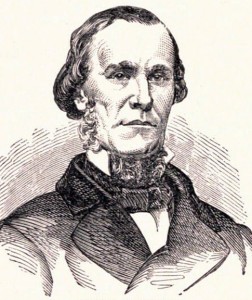 One hundred fifty years ago today the Chicago (IL) Tribune published an excerpt from the Savannah (GA) Republican that described a new controversial order from Georgia Governor Joseph E. Brown. If the Confederate War Department wanted to move any Georgia regiments out of the state, Governor Brown required that they first seek his permission. As “the Confederate States have existed but for a day,” the Savannah Republican explained that they had no choice but to “rely upon the several States” for men and supplies. Yet Governor Brown’s order came at the worst possible time. As the Savannah Republican argued:
One hundred fifty years ago today the Chicago (IL) Tribune published an excerpt from the Savannah (GA) Republican that described a new controversial order from Georgia Governor Joseph E. Brown. If the Confederate War Department wanted to move any Georgia regiments out of the state, Governor Brown required that they first seek his permission. As “the Confederate States have existed but for a day,” the Savannah Republican explained that they had no choice but to “rely upon the several States” for men and supplies. Yet Governor Brown’s order came at the worst possible time. As the Savannah Republican argued:
“Governor Brown may be technically right in this order; but he has, at least, selected an unfortunate time for issuing it. From the beginning a misunderstanding seems to have existed between him and the Confederate authorities to be found with no other State, and it is high time it had been brought to a-close. It has been a source of serious confusion and embarrassment in all our movements for defence, and it allowed to continue, will wholly demoralize the service.”
You can read more about Gov. Brown in Joseph H. Parks’ Joseph E. Brown of Georgia (1977).
19
May
11
One hundred fifty years ago today the New York Herald reported on problems with the mail delivery to Union soldiers stationed around Washington DC. “Nothing is more frequent than to hear complaints of the non-receipt of letters at the various camps in and Washington,” as the Herald explained. Yet after the Herald investigated the problem it found that “the Post Office authorities [in New York] or at Washington” were not responsible. Instead, the problem was created by New York residents who were not mailing the letters properly. As the Herald described,
In most instances letters addressed to the members of the various regiments in service are dropped into the lamppost boxes in various quarters of the city, without bearing the extra one cent stamp in addition to the three cent stamp – the regular postage for letters deposited at the General Post Office.
If residents remembered to include the correct postage, the Herald hoped that “there will be no more complaints of missing letters.”
17
May
11
“The Civil War in Missouri”
Posted by sailerd Published in Civil War (1861-1865), Historic Periodicals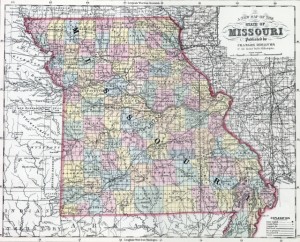 One hundred fifty years ago today the Savannah (GA) News published a short report on the serious conditions that existed in Missouri. The News characterized the situation as one in which the Republicans were trying to take over the state with force. They “are making open war upon the people of that State who refuse abject submission to Abe Lincoln,” as the News explained. In addition, the News described an incident in St. Louis in which Republicans had apparently killed civilians:
One hundred fifty years ago today the Savannah (GA) News published a short report on the serious conditions that existed in Missouri. The News characterized the situation as one in which the Republicans were trying to take over the state with force. They “are making open war upon the people of that State who refuse abject submission to Abe Lincoln,” as the News explained. In addition, the News described an incident in St. Louis in which Republicans had apparently killed civilians:
According to the newspaper accounts, the late massacre by his troops in St. Louis was of a more serious character than at first reported. – Some twenty persons – men, women and children – were killed, and a large number were wounded. It is further stated that no attack was made upon the troops by the people, who hooted and jeered the Lincoln troops, when three of the German companies fired upon them.
Yet even though northerners were “collecting supplies to be sent immediately to the Lincoln forces in Missouri,” the News remained confident “that the day of retribution… is not far distant.” As the News concluded, “there is a spirit of resolute resistance in both Missouri and Maryland, that will not be easily subdued.” You can learn more about the war is Missouri in Bruce Nichols’ Guerrilla Warfare in Civil War Missouri, 1862 (2004) and Donald L. Gilmore’s Civil War on the Missouri-Kansas Border (2005).
16
May
11
“Help From England”
Posted by sailerd Published in Civil War (1861-1865), Historic Periodicals Themes: US & the World One hundred fifty years ago today the Chicago (IL) Tribune reported on the recent announcement that the United Kingdom would not intervene in the struggle between the United States and the Confederacy. “The only crumb of comfort for Jeff. Davis…[is] that the Southern Confederacy will be recognized, not as a power, not as a Government, but simply as a “belligerent,” as the Tribune noted. As a result, “Jeff Davis’s privateers [would] not be seized” unless they interfered with English merchant ships. Some Confederates had predicted that the United Kingdom would immediately intervene in the Civil War, but the Foreign Secretary’s announcement had dashed those hopes. “The wild idea that England will send out a naval force to break through the blockade established by the United States Government, is not mentioned as a thing which has ever been dreamed of in Downing street,” as the Tribune explained. You can read more about this issue in Howard Jones’ Union in Peril: The Crisis Over British Intervention in the Civil War (1992), Blue & Gray Diplomacy: A History of Union and Confederate Foreign Relations (2010), and Amanda Foreman’s A World on Fire: An Epic History of Two Nations Divided (2010).
One hundred fifty years ago today the Chicago (IL) Tribune reported on the recent announcement that the United Kingdom would not intervene in the struggle between the United States and the Confederacy. “The only crumb of comfort for Jeff. Davis…[is] that the Southern Confederacy will be recognized, not as a power, not as a Government, but simply as a “belligerent,” as the Tribune noted. As a result, “Jeff Davis’s privateers [would] not be seized” unless they interfered with English merchant ships. Some Confederates had predicted that the United Kingdom would immediately intervene in the Civil War, but the Foreign Secretary’s announcement had dashed those hopes. “The wild idea that England will send out a naval force to break through the blockade established by the United States Government, is not mentioned as a thing which has ever been dreamed of in Downing street,” as the Tribune explained. You can read more about this issue in Howard Jones’ Union in Peril: The Crisis Over British Intervention in the Civil War (1992), Blue & Gray Diplomacy: A History of Union and Confederate Foreign Relations (2010), and Amanda Foreman’s A World on Fire: An Epic History of Two Nations Divided (2010).
11
May
11
New York Zouaves in Washington, DC
Posted by sailerd Published in Civil War (1861-1865), Historic Periodicals, Letters & Diaries Themes: Battles & Soldiers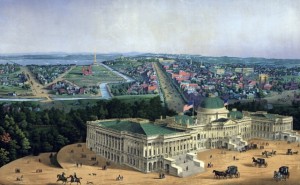 One hundred fifty years ago today the Cleveland (OH) Herald published a report from the Philadelphia (PA) Press on how the New York Zouaves in Washington, DC were called in to put out a fire at the famous Willard’s Hotel. As the soldiers were unable to find any ladders, the Press‘ correspondent described how:
One hundred fifty years ago today the Cleveland (OH) Herald published a report from the Philadelphia (PA) Press on how the New York Zouaves in Washington, DC were called in to put out a fire at the famous Willard’s Hotel. As the soldiers were unable to find any ladders, the Press‘ correspondent described how:
The New York boys…sprang to the windows of the telegraph office, between the burning store and the main entrance to the hotel; from the window they raised members of the company on their shoulders to the next window, and thence they continued from window to window until the top of the building was gained – an adventure worthy of great commendation, as it was accomplished only through heroic daring and effort. Hose pipes were immediately handed up, and water applied to the flames, which had then broken out on the roof of the wing…. The New Jersey and New York men worked heroically, and a prospect of saving the main building began to be realized.
John Hay, who worked as President Abraham Lincoln’s secretary, noted in his diary that “Ellsworths Zouaves covered themselves with glory… in saving Willard’s Hotel and quenching a most ugly looking fire.” “They are utterly unapproachable in anything they attempt,” as Hay concluded. Yet almost two weeks later the New York Zouaves’ commander, Elmer E. Ellsworth, was killed after he removed a Confederate flag from a building in Alexandria, Virginia. “So much of promised usefulness to one’s country, and of bright hopes for one’s self and friends, have rarely been so suddenly dashed as in his fall,” as President Lincoln told Ellsworth’s parents. You can learn more about Ellsworth in John Hay’s “Ellsworth,” Atlantic Monthly (1861) and Ruth Painter Randall’s Colonel Elmer Ellsworth: A Biography of Lincoln’s Friend and First Hero of the Civil War (1960).
10
May
11
“Not a War against the South”
Posted by sailerd Published in Civil War (1861-1865), Historic Periodicals Themes: Slavery & AbolitionOne hundred fifty years ago today the New York Times argued that anyone who described the Civil War as a war “against the South” and “Southern institutions” had made “a great mistake.” The only reason that President Abraham Lincoln had called for 75,000 troops after the Confederate attack on Fort Sumter was to restore the Union. “What [northerners] demand of the seceding States is, not that they shall change their domestic institutions, their Constitutions, their policy or their laws, but that they shall return to their allegiance to the Government,” as the New York Times explained. While soldiers were prepared to “fight to the death against the traitors,” the New York Times noted that they “have no lust of conquest…[or] thought of subjugation.” Not only was slavery not an issue, but the New York Times pointed out that the new southern government did not represent a significant change:
The Constitution of the Federal Government in all its essential features has been adopted as the organic law of the new Confederacy, while the Constitutions of the States themselves remain unchanged. Their relations to the central Government differ in no material respect from their relations to the Government at Washington.
Yet despite this fact southerners had “rush[ed] into rebellion as if the overthrow of government and the initiation of a bloody civil war were no crime.” In addition, the New York Times predicted what would happen after the war. While the “hanging of individual traitors and the scattering of demagogues” might occur, the New York Times believed that “the seceding States… will come back with all their rights unimpaired, their sovereignties fully guaranteed, and their domestic institutions as subject to their own control as are those of New York to-day.” You can read more about the New York Times during this period in Augustus Maverick’s Henry J. Raymond and the New York Press, for Thirty Years (1870) and Francis Brown’s Raymond of the Times (1951).

